Book One:
A SIMPLE ACT OF KINDNESS
|
CHAPTER
FOUR:
ST. JOHN'S SCHOOL
Written by Rick Archer
©
2015, Richard Archer
|
 |
|
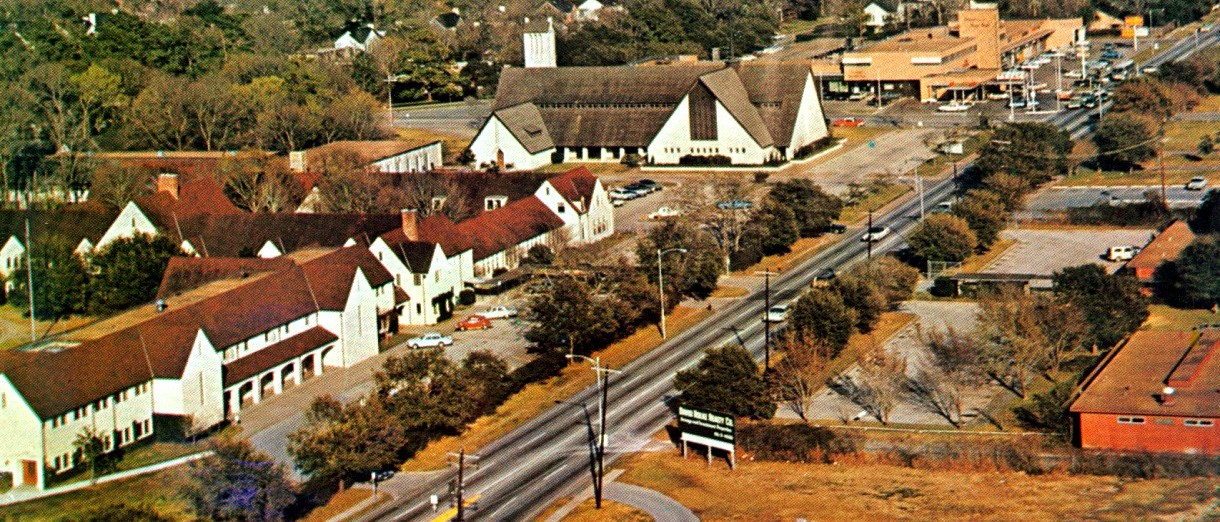 |
This 1968 picture shows St. John's School and
St. John's Episcopal Church. Although SJS was loosely
affiliated with the church, St. John's had no religious ties. That street is Westheimer. In my Senior year, I
had a narrow brush with death in a car accident that took place in
the upper right
corner.
|
RICK ARCHER'S
NOTE
St. John's School was
the absolute center of my life for nine years.
I would have to say that
St. John's is the major reason why I didn't turn into a sociopath.
As an only child left unsupervised a great deal of
the time by a woebegone mother, I had ample
opportunity to turn delinquent. For that
reason, I owe my teachers and the people who ran St. John's School quite
a debt. These were the people who saved me from falling off
the path during my miserable childhood.
Considering I probably caused the Administration
more grief than any other single student, it is ironic that these
men worked so hard to guide me with little but aggravation to show for
their efforts. To this day, I am still amazed
at the lengths these men went to keep me headed in the right
direction.
|
| |
SUBCHAPTER 15
- ST. JOHN'S
SCHOOL
|
| |
St. John's is a
college preparatory school located in the wealthy River Oaks area of
Houston. Founded in 1946, over the years St. John's developed a reputation as the strongest academic school in the city.
Starting in the 4th grade, I attended St. John's for nine years.
By the time I graduated in 1968, I was firmly convinced SJS
deserved its lofty academic reputation. I watched this school turn out
National Merit Scholars as efficiently as any assembly
line turns out cars.
|
In the tradition of the fine Eastern prep schools such as Exeter,
Andover, Brooks and Groton, St. John's was
established as a college preparatory school. However, it was
not Houston's first; Kinkaid School in the Memorial area
had been founded forty years earlier in 1906.
Following World War II, several
wealthy benefactors in the River Oaks area decided Houston would
benefit from a second institution. The main purpose of
Saint John's was to prepare its students for college. The founders were successful in their mission. By the time I graduated,
SJS had been open for
twenty-two
years. I was told in that time only four students had
failed to go directly to college after graduation.
I thought that was
an impressive statistic. St. John's had certainly earned its 'Elite
College Prep School'
reputation.
The Puritan ethic -
work, study, get ahead - was pervasive throughout the school. St. John's
stressed the importance of 'education' and 'achievement'. I
completely bought into the school's purpose. SJS would help gain
us
admittance to the college of our choice and prepare us to excel once we got
there. Getting into college became the single most important
goal in my life. In fact, it became an obsession.
|
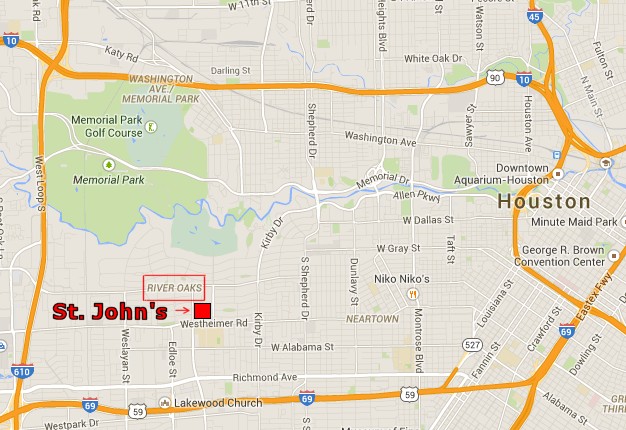 |
SUBCHAPTER 16
-
ALAN LAKE CHIDSEY, SJS HEADMASTER
|
| |
Mr. Chidsey had
helped found St. John's in 1946. He would go on to
serve as Headmaster for twenty years. Mr. Chidsey
was a fixture at St. John's for eight of the nine years I
attended. He retired in 1967 at the end of my Junior year
in high school.
It should be clear
by now that my parents were sub-standard. One of their
biggest problems was straight talk. They were such cowards
that they could not even find the courage to reveal their
decision to divorce. Instead they shipped me off to
Virginia to spend the summer with Uncle Dick and Aunt Lynn.
"Oh, and by the way, do you guys mind telling Richard about
the divorce?"
During the summer
Lynn and Dick went beyond the call of duty to make me feel
welcome. Seriously, even with four children of their own,
I was made to feel like their 5th child. I think they
became very fond of me. Trust me, it was mutual. I
fell in love with them too. Oh, how I yearned I could stay
here and never return to Houston! In Hindsight, I
believe the time we spent together that summer played a major factor during
a crisis related to St. John's.
|
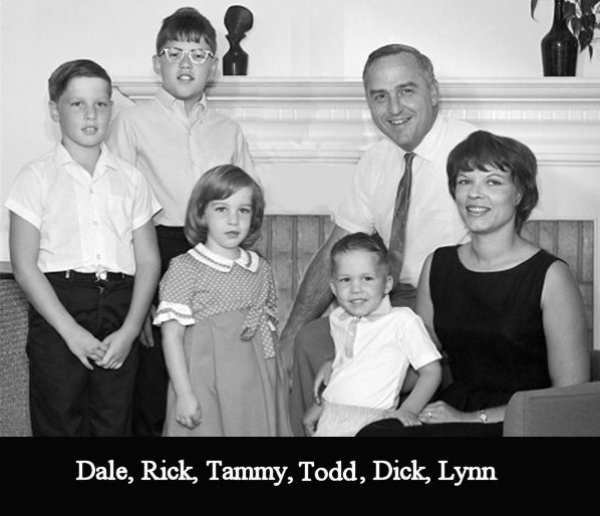 |
My problem started at the end of the Sixth Grade when my father
announced he would no longer pay for my St. John's education.
I was aghast! At the time, it felt like the end of the world.
Forced to honor the
terms of the divorce agreement, my father
had paid the first three years of tuition at St. John's
(4th, 5th, 6th grade). Truth be told, paying full tuition at St.
John's was far beyond my father's pay grade. In order to make
ends meet, he insisted his former mistress, now his wife, continue
to work full time. Take a quick guess how well that sat with
the mistress. No wonder she hated me.
However, my father's ordeal was
over. Now that he was no longer
obligated, my father refused to
continue paying.
He said it was more practical to put all that tuition into a
savings account for college. College? What was he
thinking?
At the time, St. John's was the only thing
keeping me glued together.
My father's decision was a
disaster, so I begged him to change his mind.
"Dad, I love my
school! I have done really well here. I have never
missed the Honor Roll once. Besides that, my mother can't keep
a job. St. John's is the only thing
that keeps me from going insane!
Please don't do this to me."
My words fell upon
deaf ears. Although I practically begged him on my knees, my father
wouldn't budge.
After my father bailed, my mother appealed to St. John's for help.
Mr. Alan Chidsey, the Headmaster,
noted that I had been an honor student from the moment I
entered the school three years earlier. Apparently my
strong academic record was a definite point in
my favor. In the same manner as an elite football team can
never have enough athletes, St. John's valued its best-performing
students highly. Sympathetic to the financial crunch my mother was in,
Mr. Chidsey offered a half scholarship. Mom was broke.
She couldn't pay
that. But she knew how much the school meant to me, so
she got her brother on the phone to ask if he could help.
Uncle Dick said he would talk it over
with his wife. Aunt Lynn, bless her
heart, said yes. Lynn and Dick generously paid my way
to St. John's during the 7th
and 8th grade.
|
I knew Mr. Chidsey
had done me a serious favor to grant the half-scholarship, but
I had never actually met him. That changed in the 8th
grade. Mr. Chidsey taught a unique class known as Bible
History. I had been raised a Quaker. Since we spent
absolutely no time in Quaker Meeting studying the Bible, I knew
next to nothing about it. I am embarrassed to admit my
attitude was apathetic. Who cares about the Bible? I
went to this mandatory course assuming I was going to hate the
class. Boy, was I wrong! To my surprise,
I loved this class. I could npt believe Bible History was
so intense!
I could tell Mr.
Chidsey really loved this material. In fact, Mr. Chidsey
had even gone to the trouble of writing the textbook himself.
He did a good job too. His book was interesting reading. I was so taken with the Land of Israel (or Judea, or Canaan,
or whatever its revised name was) that I practically
memorized the textbook.
Poor Israel!!
Good grief, the Jews were always being conquered by someone.
Since Israel was a land with no natural defenses and a small
population, it seemed like every single ancient dynasty took
turns subjugating the people of this coveted land... Greeks,
Romans, Persians, Assyrians, Babylonians, Philistines,
Egyptians.
Now I finally understood why the Jews
felt so persecuted. It seemed like the whole world was against them. Considering how much
I felt like the world was against me too, this probably explains why I
felt such a strong emotional connection to Israel's miserable plight. They were outnumbered at all times, but they
fought fiercely to defend their country. I admired that.
|
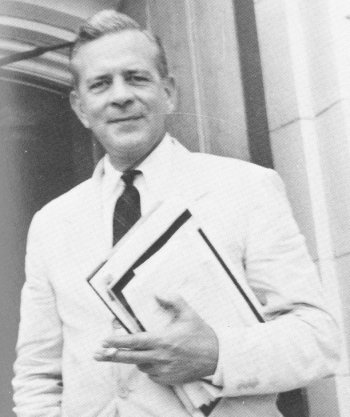 |
One day in
October I noticed Mr. Chidsey was directing a play
for the Middle School. Since I liked his class so
much, I auditioned. To my surprise, I was given a
small, but fun role as a drunken pirate. I even had a
speaking line. I was
having a great time. Due to my status as 'the poor
kid', I had trouble finding friends. But maybe
this self-defeating attitude was all in my head.
Seeing me come out of my shell, the other students were nice
to me. So was Mr. Chidsey. He was very
encouraging. Not a day went by when he did not mention
I was doing a good job. As well I should.
Curious to know how drunken pirates were supposed to act, I
had watched Errol Flynn in 'Captain Blood'.
Thanks to my homework, St. John's today, Broadway tomorrow.
One week before the
debut, I got into a serious argument with my mother. I was so
incensed by her lack of interest in my play that I decided to quit.
Mr. Chidsey was appalled by my decision. He pleaded with me to reconsider, but I was too stubborn and
embarrassed to change my mind. I cannot begin to describe how
ashamed I was for letting him down. I began to
sit in the back row just so he would not call on me in class.
However, I continued to pay close attention.
I
was pleased to receive an 'A' in Bible History for the First and
Second Semester. One day in February, Mr. Chidsey was
handing out the test results to students as they passed by at the end of class. As
he handed me my test, he stopped me before I could pull
away.
"Richard,
would you mind waiting a second?"
Uh oh. I assumed I was
in trouble for something, but I could not imagine what it
was. Due to my problems at home, I was a pretty
fragile kid back in those days. For that reason, I
followed the rules.
After the last student left, Mr. Chidsey turned to me. "Young man, I just wanted to tell you how proud I am.
You have made the highest score in class on the past two tests."
Little did Mr.
Chidsey know, but I didn't have much else to do these days
but study. Lonely and friendless, I had turned into quite the bookworm. I would shoot basketball at the park in the afternoon while
my dog
Terry chased squirrels, then I would study for several
hours each night.
"Uh, gee, thank
you, sir," I replied. "Bible History is my favorite class. I
enjoy listening to your stories. You make the past
come alive."
Mr. Chidsey said
nothing, but he took a long
look at me. Obviously I had touched him with my
answer. Once he realized my compliment was sincere, a
big smile broke out on his face. That is when I fell to
pieces. Out of nowhere, my guilt became more than I
could bear. The dam broke and words started to gush
out.
"Listen, Mr.
Chidsey, I have something to confess. For three months I have been too
afraid to apologize to you for
dropping out of your play. Not a day goes by in your
class when I don't feel regret. I am so sorry, sir.
You were nice to me and then I let you down like that.
Will you forgive me?"
Suddenly I was
overcome with emotion. All that frustration
came to a head and I couldn't hold the tears back.
I was so embarrassed. A 14 year old boy is not
supposed to cry, but disappointing Mr. Chidsey for such a
stupid reason was the rawest nerve in my body. I turned my back to Mr. Chidsey and tried to wipe the tears
away. After a moment to let me compose myself, Mr. Chidsey put his hand on my shoulder and told
me it was okay.
"Don't
worry, son, I'm not mad at you. I just couldn't
figure out what went wrong. You were having so
much fun in rehearsal and then out of nowhere you quit.
For the life of me, I could not understand the reason
behind your decision. Do you mind telling me now?"
I looked down
and tried to calm down. "Oh, it's so stupid, you
have no idea."
Mr. Chidsey
pointed to two chairs. "Come here and sit down with
me. Tell me what happened and let's see if I can
follow along."
"But I have to get to
class, sir!"
Mr. Chidsey laughed.
"Don't worry about that. I know people in high places."
At his
insistence I sat down. At first I hemmed and hawed
some nonsensical excuses. But then I got mad at myself for
beating around the bush, so I decided to just tell him the
truth.
"One night I was mad at my
mother. Rehearsals had always been in the afternoon,
but now we were required to come at night for dress
rehearsal. We had just moved really far from here.
When I asked her to give me a ride home late at night after
rehearsal, she told me I would have to take the
bus. I was afraid of what kind of people I would meet
late at night, so I refused to take the bus. That is
when we got into a big fight."
"Why do you
suppose she said that? Most of the mothers I know
don't expect their children to ride a city bus late at
night."
"I'm sorry, Mr.
Chidsey, I don't want to burden you with my personal life."
Mr. Chidsey
smiled. "No, I don't mind. Please share the full
story with me."
"My mother had
done something she regretted. She threw her boyfriend
out of the house and told him to go back to his wife in
Mexico. After that, she missed him so much she
was angry at the world. I caught her in a bad mood, so
she took it out on me. Then I got mad and lost my
temper. I said I would quit if she didn't give in, so
she said go ahead and quit if it made me happy. And
there you have it. Refusing to give my mother the
satisfaction of seeing me give in and ride the bus, I boxed myself into a corner with
my big mouth. I have regretted what I did ever since."
Mr. Chidsey's
eyes grew about as wide as humanly possible. Then he
began to nod. "Thank you
for sharing that. I know it wasn't easy, but I
respect you for giving me your apology and your explanation."
Respect me?
Boy, it had been a long time since anyone said they
respected me. I immediately started sniffling again,
but this time I regained control a bit faster. Mr.
Chidsey studied me in silence for a moment, then resumed.
"Listen,
Richard, you
need to get to your next class. Just tell them to
speak with me if they ask why you were late. I want you to
know I appreciate that you have spoken to me today.
If there's anything else you wish to talk about, please
don't hesitate to see me."
After I left,
that was the best I had felt in a long time. Mr.
Chidsey had handled that awkward conversation with dignity. He had been a real friend. That
night, I read my Bible History assignment with a sense of
enthusiasm that had been missing for some time. We
did not speak again for a couple of months. However he
did smile at me on several occasions. I could tell he
had forgiven me. That was important. Something
interesting happened after our talk. I was always my
worst enemy, full of neverending self-criticism.
However my talk with Mr. Chidsey had released much of the
anger I felt towards myself. I was in a much better frame
of mind for the remainder of the year.
Meanwhile my morbid
fascination with Israel continued. One thing that I
couldn't figure out was why the whole world wanted to conquer Israel. This had to be the ugliest, most barren
landscape I had ever seen. To begin with, the Dead Sea was the most accurately named body of water in the world.
Furthermore those arid deserts were devoid of
life. The deserts of Israel made Death
Valley look like the fertile crescent. Centuries and
centuries of fighting over what?? These were not battles
to gain control of lush valleys
and valuable life-giving rivers, but rather a bunch of rocks and
unfertile soil. All
that blood for a place that looked like this? That made no sense to me. Why did everyone want to conquer Israel?
Who is willing to die for barren sand and salt water? I couldn't
figure it out.
So one day I stayed
after class. After naming the best-known enemies such as
the Romans, Persians and Egyptians, I asked
Mr. Chidsey why Israel kept getting conquered all the time.
Why did people care so much about this barren landscape?
Mr. Chidsey broke
out in the widest grin. With a laugh, he said, "Young man, you forgot to add the Muslims, Turks,
Palestinians and British to your list. It was just
Israel's bad luck to exist at the crossroads of ancient civilization.
In order for each new conquering army to get somewhere, it had to
eventually cross through the Land of Israel. As the
invaders
passed through, they might as well take the time to conquer Israel."
I nodded in
wonderment. Mr. Chidsey looked very amused by my curiosity.
He could see I was hooked
on Israel. Israel had so many enemies, who
could keep them all straight? Nevertheless I made a real effort to keep
the names organized in my mind. For the rest of the year,
whenever Mr. Chidsey asked a
question, I was often the first person to raise a hand. I
am fairly certain Mr. Chidsey knew how much I loved his class.
It was true. Bible History had become my favorite class. Any teacher appreciates a kid who takes the material to heart
like I did... especially when the teacher has written the textbook himself!
|
At the end of the 8th
grade, I faced yet another crisis
regarding my future at St. John's.
Uncle Dick told my mother he could not afford to send me for
another year even at half-price. He had four children
of his own and he was starting a new business. My mother
did not protest. She knew Uncle Dick would help if he
could. She thanked him profusely for what he had done and
made sure he didn't feel guilty. By caring so much about
me, Mom insisted Uncle Dick had done
more for me than my own father. For once my mother was
right. Uncle Dick was special. So was Lynn. I
understood. They did the best they could.
However I was despondent
over St. John's. I had desperately hoped to continue the 9th
grade, but now I was in real
trouble.
Over the ensuing summer, I managed to get rid of Neal the taxi
driver, Mom's disgusting live-in boyfriend. However I was too
depressed over St. John's to gloat very much. I was sick with worry
about leaving my beloved school.
For the past five years, St. John's had been my refuge. It was the
only place where I could hide from Mom's unwanted boyfriends and my crazy home life. Considering how
important this school had become to me, one can imagine my despair
when it appeared I would be leaving to attend public school.
In late July 1964, one
month before the start of the next school year, my mother called Mr. Chidsey to
tell him the bad news. Could Mr. Chidsey perhaps recommend a
good public high school
for me? Mom was in and out of work throughout my
childhood. Whenever she did not work, the bills piled up.
She developed a bad habit of skipping out on her apartment
whenever her rent obligation ballooned. Since we were always moving anyway, Mom
told Mr. Chidsey she would
find an apartment nearby whatever school he suggested. Mr. Chidsey said he would research that
question and get back to her.
A couple nights later Mr. Chidsey called
my mother at home. If St. John's offered a full
scholarship, would she be able to pay for books and meals?
This offer was completely unexpected. Stunned and
delighted, Mom said she would do her best.
Mr. Chidsey was
pleased with her answer. He said he was
proud of my record at St. John's and would hate to lose a good
student like me. Pointing out that
St. John's had a five year investment in me, Mr. Chidsey
said he believed strongly in helping students who tried as hard as I did.
And so I received a full scholarship for my final four
years of high school. I burst into tears with relief.
It crossed my mind that his evaluation of me in the Bible History class
had an effect on his decision to take a gamble on me. I had a hunch Mr.
Chidsey developed a fondness for me based on his first-hand
experience.
I wouldn't call myself 'teacher's pet', but he was always very
warm towards me. It was mutual. Mr. Chidsey had been
very kind to me.
Despite my sullen,
moody exterior, I was a good kid at heart. I loved
animals, I was respectful to adults and always
eager to do whatever asked. Aunt Lynn and Uncle Dick knew
this. That is why they quietly made me their fifth child.
I imagine it cost more money to send me to St. John's than they
spent on any of their own four children. What a sacrifice!
Mr. Chidsey was another person who discovered I was a good kid.
Talk about a silver lining. How fortunate to have awkward
circumstances regarding the school play allow Mr. Chidsey to get
to know me. Would Mr. Chidsey have given me a full
scholarship otherwise? I believe the
rapport we developed in Bible History made it so much easier to
reward me.
St. John's did mean the world to me. To this
day I regard my marvelous St. John's education as the great
miracle of my life. My superb education would open many
doors throughout my life. But it wasn't just the education that made me
so grateful to my school. During my nine year stay,
Mr. Chidsey was not alone. Every year it seemed like a
teacher would take a shine to me. Without letting me know
what they were up to, they would guide me
in lieu of
parents who continually dropped the ball. It was not
till many years after graduation that I realized what my mentors had
done. My teachers were
so
skillful I never had a clue. Mr.
Chidsey was one of those people. He joined a long line of silent mentors who went to bat for me
throughout my
troubled childhood.
|
SUBCHAPTER 17
-
ADMISSION TO St. John's
|
To me, St.
John's was a marvelous academic institution.
However,
there were many other faces and facets to St. John's
than academics. St. John's served as an important
social hub to the members of Houston's High Society.
The rich and mighty mingled on our campus daily.
St. John's
School is located in the very heart of River Oaks, a
tony neighborhood hidden under a thick canopy of stately
oak trees. This area is where Houston's 'Old Wealth'
lives in stunning palatial estates.
St. John's was not a
large school when I went there. There were only fifty students
in my graduating class, two hundred and twenty in the four grades of
the Upper
School (9-12).
St. John's was a small,
close-knit place that built its reputation on its academics.
Early on, the founders were determined to improve their product by
capping the size of the classes.
|
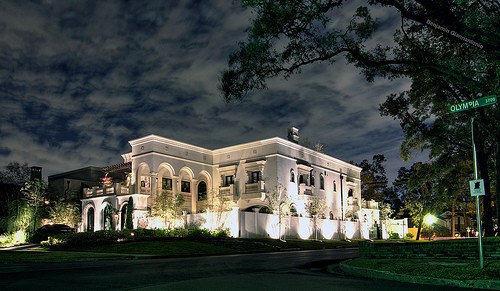 |
Indeed, the size of my individual classes never exceeded fifteen students.
This guaranteed close interaction between the top-notch
instructors and the gifted students.
The school was also
determined to select the
smartest students possible, often taking bright kids from middle
class homes over average students from wealthy homes. I
suppose a case could be made that I was one of the beneficiaries of
that objective.
The school had a waiting
list a mile long of students who wanted to enroll. However St.
John's never seemed in any hurry to expand. If my school grew
during my time there, that was news to me. The size of my own particular
class of 50 students never changed.
Therefore, based on the
law of supply and demand, the limited openings
guaranteed that admission was a highly valued commodity. Since
there were quite a few parents who wanted the
best education for their children that money can buy, every spot was coveted.
However,
my school
had a reputation as a place where money could not buy admission to the
school.
St. John's was so ridiculously well-endowed that it didn't need
anyone's money. The kid had to be
smart enough to get in or tough luck. That hard line attitude
won the school a lot of respect in High Society circles.
If someone's child was
smart enough to get into St. John's, that meant
something special.
Let me put
this another way. To some people, having a child who attended
St. John's was a major status symbol. Admission to
SJS carried a
great deal of prestige in the status conscious world of
River Oaks. It meant someone's son or daughter was
smart and it also meant the parents had considerable
wealth to be able
to afford this place. By extension, it meant the
parents were likely smart as well.
In other words, having a
child at St. John's meant the parent was both rich and smart, a real
asset to anyone's reputation.
|
SUBCHAPTER 18
-
The St. John's Mother's Guild
|
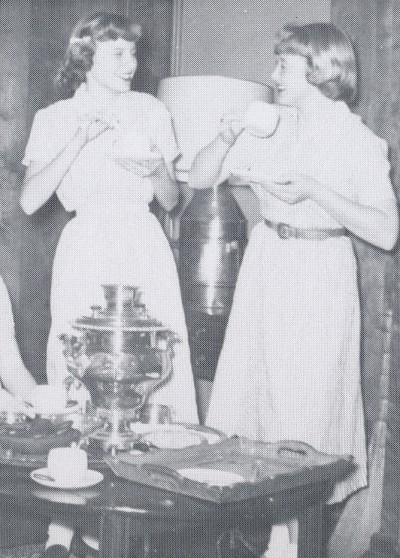 |
Having a child at St.
John's bestowed a special honor to their mothers. It served as
entry into an exclusive club
known as the St. John's Mother's
Guild.
One of the benefits of
having a child attend St. John's was the chance to rub elbows with
the River Oaks elite on a regular basis. The school made a
point to serve as a daily meeting place. In a manner similar
to the court of Versailles, it was a definite privilege to associate
with women who dominated Houston's society columns.
While Houston's men of wealth
pursued their business careers in skyscrapers downtown, women of wealth pursued their social
agendas
here at my school. The ladies of Houston's social
elite gathered here at SJS on a regular basis to see and be
seen.
Borrowing a tradition
from English and New England prep schools, St. John's served high tea at 1:30 pm every day in the
Commons Room. Not
surprisingly, the mothers of the children who attended
this elite institution enjoyed coming to St. John's on
a frequent basis to network, visit with their friends
and pursue various business projects and charitable
events.
I never had the
opportunity to
learn the ins and outs of the Mother's Guild, but I had the feeling
it was a volunteer organization open to mothers of children in the
Upper School.
The
Mother's Guild was a group of confident women who helped
guide the fortunes of St. John's behind the scenes.
In particular the Mother's Guild was concerned with the
"Social" side of SJS. These ladies
planned various social
activities for the students.
The activity I remember
best were the dance parties
held at the River Oaks home
of various St. John's students after every home football game. These dance parties were sponsored
by the Mother's Guild and open to all SJS high school students.
|
I first became aware of the Mother's Guild in the 4th grade during
my first year at the school.
One day early in my
first year I noticed a large group of women wearing
expensive dresses congregating near my home classroom. These
ladies were meeting in the Commons Room, a
spacious reception area designed as
a greeting spot for private events.
These ladies were all
chatting and milling about. I was so taken by these
animated women that I stopped to watch.
With their fine clothes, furs, jewelry, perfectly styled hair and
perfect figures, these patrician
women were unusually attractive.
At age 10, I was easily
impressed. I made sure to stop and watch the ladies whenever I
had an extra moment. With my 4th grade
locker situated right next to this area, I had the perfect vantage
point to study these women on a daily basis.
I had never seen 'wealth' displayed like this before. I was from a middle class
home with parents who did not socialize much. I had no idea
women who looked like this even existed. Compared to my own
mother who dressed modestly and had a humble manner, these women acted like celebrities.
Based on the way they
carried themselves and spoke with such confidence, I concluded these dynamic women must be very
important.
From the moment I attended St. John's, I was unusually curious
about the Mother's Guild. Although I never consciously understood why,
the reason is obvious.
Looking back, no doubt my issues with my hapless mother
made me overly
curious about the subject of motherhood in general. I
could not help but compare these high dominance women with their
perfect posture and regal bearing to my struggling mother and wonder
what kind of mothers they were.
|
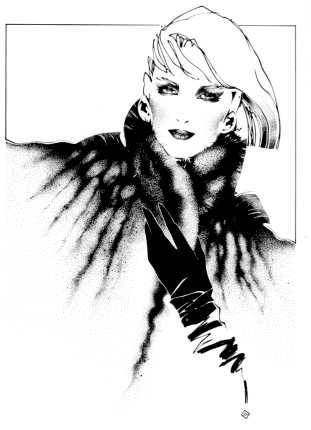 |
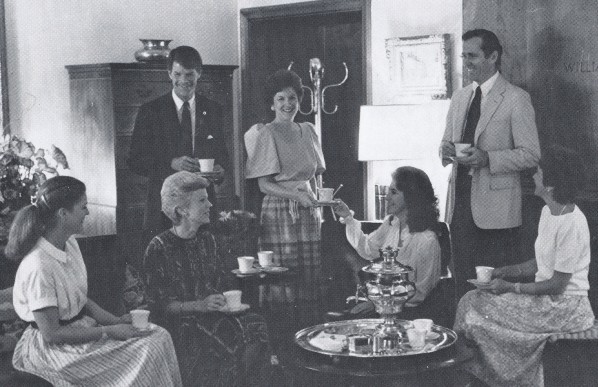 |
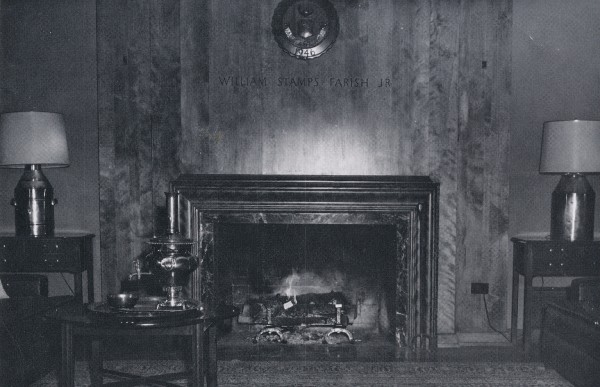 |
| |
|
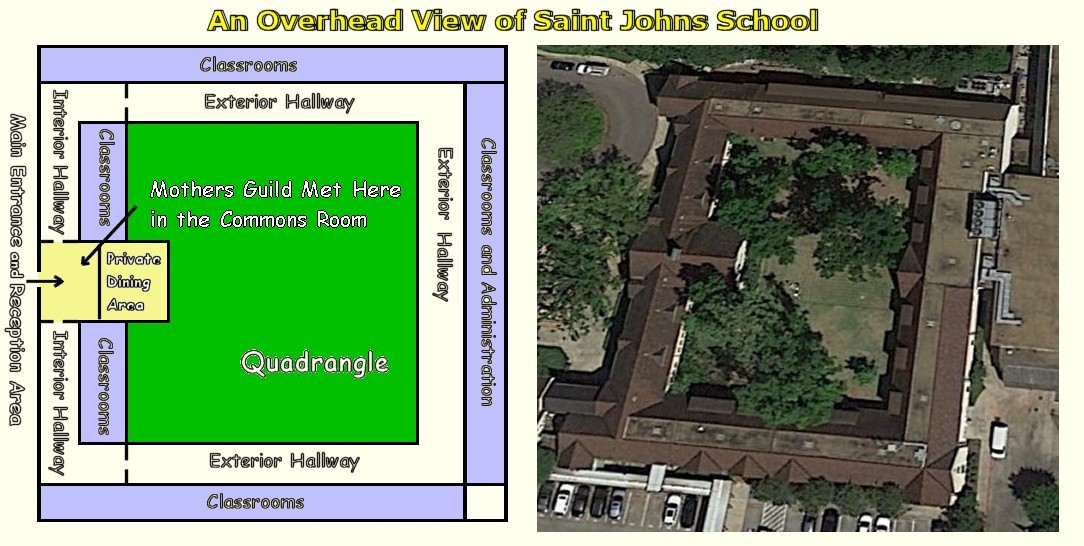 |
| |
St. John's
was divided into three sections. The Lower School
was on the south side of Westheimer while the Middle
School (Grades 4-8) and Upper School (Grades 9-12) were
on the main campus on the north side. The two
sides were connected by a tunnel under Westheimer
Street.
The lovely
Quadrangle in the center of the middle
school served as the central focus of the campus.
This is where pep rallies and graduation
exercises were held. During the school year, only the
seniors had permission to walk in the Quadrangle.
The Commons Room
was located at the entrance to St. John's. Right outside was the area where
children were dropped off in the morning and picked up
in the afternoon.
|
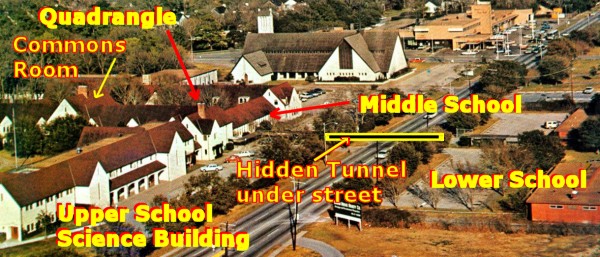 |
The Commons
Room was where the afternoon social events were held.
Since school
ended at 3:30, it made perfect sense for the mothers to attend an hour of
coffee and tea at 1:30 pm to hobnob with friends and acquaintances
while they waited for their children.
It seemed to
me some of these ladies practically lived in the Commons Room.
I saw the same faces all the time. I had the impression
these ladies would meet at St. John's in the late afternoon at
least twice a week, maybe even three times. Truth be told, high
tea was held every day, but back in those days I wasn't paying enough attention to figure
that out.
The ladies
would
mingle in a lush, carpeted area decorated with wood paneling,
valuable paintings and a fire
place. The
Commons Room was furnished with plush leather chairs, comfortable couches,
expensive tea sets, and soft lighting. This was
a luxurious setting indeed.
Because I
was star-struck, I studied the women on a
regular basis. I suppose I was drawn to these women for the
same reason people watched Dallas and Dynasty. People who are rich and powerful have an
irresistible attraction about them.
|
I was ten when I first
developed my fascination with this group of wealthy, polished women.
As a small and quite harmless little boy who was the anonymous child
of God knows who, my invisibility was practically guaranteed.
Therefore I was able to do a lot of watching without anyone
noticing.
One day I saw these
ladies as they emptied out of a side door into the Commons Room.
That was the first time I realized there was a private dining area
connected to the reception area. A couple days later when no
one was looking, I peeked in. The dining room was secluded and very lovely. It had large windows that looked out
onto our beautiful inner courtyard known as the Quadrangle.
This discovery made me
realize that Lunch was another important feature to these
gatherings.
I developed a
theory that
the women would meet first for lunch. Then they would conduct
their business. Afterwards they would meet informally in the
Reception area for coffee, tea and conversation. I
assumed many of them stuck around to avoid having to make another
trip at the end of school to pick up their children. I imagine
there were days when these women were here at the school for two to four hours at a time.
Since my 4th and 5th
grade locker was right next to the Commons Room, it wasn't much trouble for me to keep track of their comings and
goings.
Students were given ten
minutes to get to their next class, about
eight more minutes than I needed. With time to kill,
whenever I noticed the group of ladies, invariably I would
invest my extra time in observation.
Sometimes
the ladies were laughing; sometimes they were deep in serious
conversation. One thing for sure - they definitely liked to talk.
|
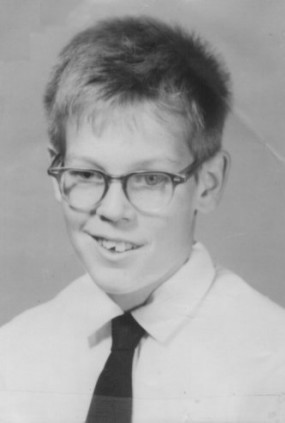 |
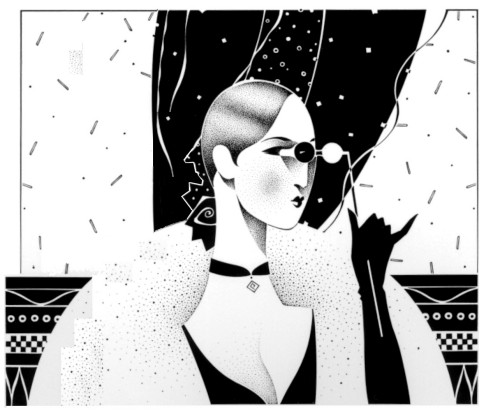 |
One day in the
4th grade, a lady noticed me watching them. Frowning, she
pointed at me and barked in a harsh voice, "Young man, who
are you? You have
no business being in here. You need to leave right now."
With that she
pointed her finger to the hallway and stomped her foot. As
I left, she glowered darts at me. I was unusually mad at her dismissal.
I was stunned by her
harsh rebuke. I was being quiet and I wasn't hurting anyone. What gave her
the right to talk to me like that? She wasn't a teacher. If this woman had
asked politely, that would have been one thing, but her rude,
imperious manner upset me. Why was she so mean to me?
I suppose in her
opinion I was invading her privacy. However,
this was a public area and this was my school. I may have
been just some lowly kid, but I had just as much right to be
here as she did. Was there some rule against watching?
If so, no one had told me.
That incident was a
turning point. It is important to note I was a
troubled child with anger issues. I was still bitter over
the divorce and about as lonely as any boy can be. Yes, St.
John's was the perfect place to challenge me academically, but I was still the same
angry kid who nearly got suspended
from public school due to my constant classroom disruptions.
|
Given my grouchy state of mind, this woman's bossy attitude rubbed
me the wrong way. On the spot I lost my admiration for
this
group.
I decided
I didn't like these women any more.
In this new light, they seemed phony and preoccupied
with social status. There was something about
their haughty air of superiority that made me feel unwelcome.
Mind you, I made
this sweeping decision based on the rudeness of just one woman.
No doubt many of the ladies were nice, but there was no doubt
that others were definite snobs.
The demand to leave
marked the beginning of the chip on my shoulder that I felt
towards the rich and famous at St. John's. This
was my first realization that I wasn't very important.
By
way of this event plus several less dramatic incidents over
time, I would conclude I occupied the absolute
lowest rung on the St. John's social ladder.
Without anyone to
reassure me, I began to feel inferior. There was a part of
me that felt like I didn't really belong here.
|
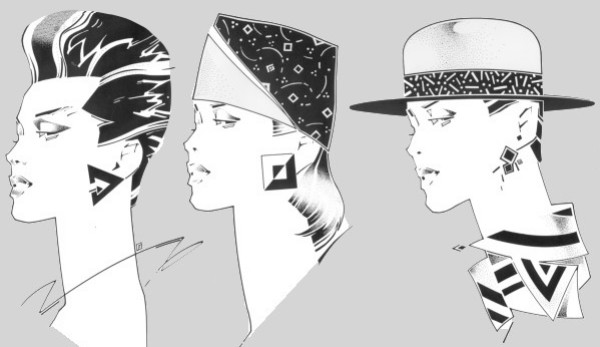 |
The men who
ran St. John's have been gifted educators, but they
had no way of shielding me from the heartache my inferior social
status would cause me. I was in for some rough times
at this school.
Social status has its winners and
losers. When it comes to social climbing, we don't
often think about the people clinging to the lowest rung,
but they do exist.
From my humble perch on the bottom rung, I
spent nine years at St. John's observing the
elegant trappings of wealth - mansions, cars,
clothes, country clubs, and beach houses.
Add to that the stories I overheard about my classmates'
summer camps and amazing vacations.
I have
little doubt I was the poorest kid in the school.
Although I was born into a middle class home, that
changed dramatically after the divorce. While my
electrical engineer father continued to rise in his
career, from that point on, his contribution to my
life was reduced to $100 a month in child support.
That left it up to my mother and her revolving door of
jobs to do the rest.
|
For
the nine years I spent at
St. John's, I would peg our socioeconomic status at the
"lowest" possible level of middle class.
For the most part, we lived
in modest apartments in the Montrose area of town. We
weren't abjectly poor, but money was always a huge issue.
Economically I would have
been in the bottom quarter at any neighborhood public school
where I lived, but at least I would have had some
company.
Here at St. John's, the gap between me and
the sons and daughters of the wealthiest families in
Houston was about the size of the Pacific Ocean.
|
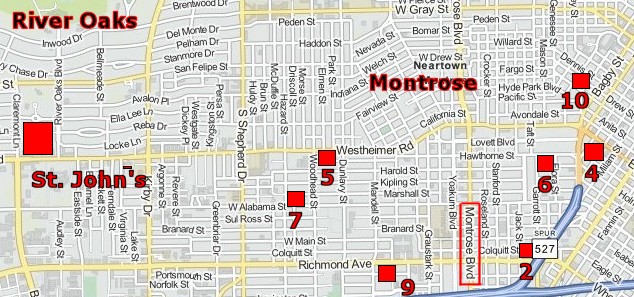 |
There were times when my envy was
hard to handle.
I am not a
person who is especially interested in material things.
Like anyone else, I wish to be comfortable, but luxury
is not a necessity. What I really wanted more than
anything else was a solid home.
There are not enough words to explain just how truly
strange my life space was compared to everyone else at
school. I believe I was the only kid in the school who rode his bike
to school. I was
probably the only kid who opened the front door wondering
if the lights would turn on. I imagine there weren't many other students who wondered if his only parent would be staying home
that night or leaving to hit the bars. For that
matter I don't imagine too many SJS students awoke to
find strange men in their mother's bedroom on a frequent
basis.
That said, my
envy of the home life of my friends was the least of my
problems. My biggest problem had to be the
loneliness.
Because I
was an only child, I lacked brothers and sisters to help
me learn how to get along with other people my age.
A major handicap was the fact that we
moved so often. Although seven of our eleven homes
were in the Montrose area, I was never in one of these
homes much longer than a year.
During the
nine years at St. John's, I made a neighborhood friend
one time and that was it. Considering we only
stayed at Emerson (6) for six months, a lot of good that
did me.
Since I
never a chance to make neighborhood friends, that forced
me to rely on St. John's for my social interaction.
That worked
well enough for the first three and a half years.
Since St.
John's used a mandatory dress code to avoid
distinguishing the rich from the not so rich, my
disguise of white polo shirt and khaki pants worked
liked a charm for my first three years. During the
4th, 5th, and 6th grade, my social status was unknown
and I was one of the pack. Since no one had any
idea just how poor I was, I was occasionally invited to
visit my wealthy classmates at their homes for birthday
parties, Saturday afternoon basketball games and
maybe even the occasional sleepover.
However my
situation changed dramatically in the 7th grade thanks
to a terrible mistake.
In the 7th
grade, I joined a boy scout troop affiliated with St.
John's. Several of my SJS classmates were members
as well. That was back in the days when I was
still accepted as an equal. We had a weekend
camping trip way out in the Texas pine forest. It
was freezing cold to begin with and then it began raining heavily
once we arrived. One degree
colder and we would have had snow.
There was no
let up in the downpour, so we had no
choice but to huddle in our tents. I shared a tent
with three other boys. Unfortunately, our tent wasn't
well sealed and my sleeping bag was of low quality.
I was miserable out there. I absolutely could not get warm. At first I
shivered constantly and then I got sick. In fact,
I was so sick that my body ached all over. I had a fever and was in real pain.
I couldn't rest because I was too cold to get
comfortable.
One of my
classmates, Fred, wanted to go home. He wasn't
sick, but he didn't like the cold at all. When I found
out someone was coming to pick him up, I begged Fred for
a ride to my apartment. I felt like such a
quitter, but I knew that whatever I had was too serious
to tough it out. Fred took pity on me and agreed
to help. I was astonished when I saw an enormous
black limousine pull up in the middle of this remote forest.
To this day, I still don't know where Fred found a phone
to call home, but I sure was happy to see that car.
Out came a uniformed driver who walked with extreme
dignity to the tent with an umbrella to fetch Master Fred.
All the boys were staring in amazement at the spectacle.
If I hadn't been in so much pain, I might have even
smiled. This was a
scene straight from a Richie Rich comic book.
There were rumors that Fred was among the richest kids
in school; now I believed it.
I was very sick, so sick that Fred insisted I sit in the
front seat lest he catch whatever I had. I am not
quite sure if Fred realized what the driver might think
about that gesture, but I was in no position to discuss
the issue.
I was barely
hanging on. After I gave the driver my address, I
quickly fell asleep in the deliciously warm car. I slept the whole way home. The driver woke me
up from my deep sleep when we got there. I was so
weak, it took me a minute just to
get my bearings again. The moment I
became alert, I groaned. Sure enough, my instincts
were correct... I had really screwed up.
As the limousine idled
in front of my run-down apartment on Travis (4) in a lower middle class neighborhood, Fred's
eyes bulged at the building I lived in. Fred asked,
"Dick, do you really live
here??"
I nodded
yes, but I died a million deaths when I saw the look on
his face. I instantly hated myself. Due to
my sleep, I had
been unable to ask Fred's
driver to drop me off at one of the nice homes a few
blocks away. This was a trick I had used with other
kids from my school when their mothers gave me a ride.
However,
I was so sick and groggy that I had
forgotten to give a fake address.
What a dumb
mistake.
As I
staggered out the car door mumbling my gratitude, I noted
Fred's wide-eyed stare of astonishment continued
unabated.
In my
condition, it was a monumental effort just to climb the
steps. When I finally I made it to the top, I
looked back. To my surprise, the limousine was still there.
With
the window rolled down, Fred was gaping at me in
disbelief.
No doubt he wanted to
see me open the front door. Fred wanted to make
absolutely sure this was where I lived before driving
away.
Fred's face
was covered with
the most profound look of pity I had ever seen directed
at me. What was his problem? Did Fred
expect the door to fall off the hinges?
Despite my pain, I felt a wave of bitterness come over
me.
Welcome to
the Real World, Fred.
After that
incident, something changed at school. I felt like
some of the kids began to avoid me. The timing was
unmistakable. I had a hunch
that Fred had said something. I doubt that Fred
said anything to be mean. He wasn't that kind of
guy. But whatever he had said had real
consequences. I suddenly felt very alone.
Nothing could
explain my sudden isolation other than Fred's likely
whispers.
It seemed
suspicious that my invitations to birthday parties
seemed to disappear. Nor was I invited to spend
Saturday afternoons with classmates at their homes any
more. I couldn't be sure what was going on.
Was this really happening or was it my imagination?
That moment
in the 7th grade marked the
beginning of my alienation at St. John's. It wasn't what my
classmates did to me that bothered me. What hurt was being
left out in various subtle ways. I no longer felt included in
my classmate's lives.
St. John's was a small
school. With fifty kids in my class, there were no secrets,
especially since
I ate lunch every day next to
my classmates. Since they had no reason to
be guarded around me, they talked about what was going on in their
lives. That made it easy to overhear stories about
the recent exciting events I had been left out of.
Maybe four kids had met
at the River Oaks Country Club yesterday afternoon to watch a pro
tennis match. Or three boys went to Memorial Country Club
to practice their golf swings. Or six kids had spent the weekend
down in Galveston at someone's beach house. Or there was a big birthday party at someone's mansion for twenty kids.
Or someone was going skiing over spring break.
They never knew I
was listening. I had become the Invisible
Kid.
This
was not 'deliberate' meanness. Not one
student in my class ever displayed any
particular animosity towards
me. Yes, I was excluded, but this exclusion wasn't the product of
any deliberate conspiracy
meant to ostracize me.
I understood my academic
scholarship to St. John's did not include an automatic
invitation to events outside the classroom. My
classmates ignored me because I was not a part of
the social circles they ran in after school. It
didn't help that I had no idea how to become
popular enough to rate inclusion into their
circles
Let
me be clear about one thing. My classmates
were always cordial towards me. I do not
recall one instance where one of my own
classmates was deliberately mean to me (the boy
who taunted me was one grade behind).
However, outside of class they ignored me... as
was their right. It wasn't their job to
worry about my self-esteem issues or my wish to
be included. Every one of my classmates had plenty of
growing-up problems of their own to worry about.
It wasn't their job to worry about me.
Although there were several mothers who treated me poorly, I
was never the victim of overt snobbery from my
classmates. Okay, there were a couple kids who
liked to needle me about my inferior clothes or
my lack of fashion sense, but I am not even sure
their comments were meant to hurt. It was
just teasing to them and I had a very thin skin.
What bothered me the most was simply feeling
left out.
No one enjoys watching a
birthday party through a window. I felt increasingly alone at my
school. I
was there, but I wasn't there.
I
wasn't part of their world any more. By
the end of the 7th Grade, I felt about as
significant as a light fixture.
A
sense of futility came over me. No
one wanted me here.
In very small ways, for nine solid years
I received subtle messages as to my inferiority.
Slowly over time, the acid of negative conditioning
would erode my confidence. Some very dark messages
would be implanted in my subconscious that would have
serious consequences later in life.
The results
were disastrous to my self-esteem. I grew up
believing I wasn't good enough in many social
situations.
For example, when it came to head to
head competitions over women, I would mysteriously throw
in the towel because I felt 'inferior' to men who reminded me of
the confident boys at St. John's. Or I would have trouble
standing up for myself when an alpha male asserted his
dominance in some way at my expense. Let's face it, there are people who enjoy making
themselves taller by stepping on those who are smaller.
I would allow myself to be elbowed to the back by men I
had the ability to go toe to toe with.
Starting
practically from the moment I arrived at the school, for
nine years on a daily basis I received subtle messages
that I was the least important person in my school.
Without a parent to counteract those messages, the
conditioning took hold. As my confidence dwindled,
I began to say less and less.
The longer I
went to St. John's, the more I became convinced I was
socially inferior to my classmates. To avoid being
reminded of my inferiority, I kept to myself
outside of class.
This self-imposed alienation prevented me from acquiring the
various secrets of popularity. I never discovered
the value of developing ways to be interesting or the
benefits from learning to listen. I had no idea how to
tell a story or a joke, I never learned to dance, and I
never learned to tease, offer encouragement or pay compliments.
I never acquired the knack of showing interest in other
people or how to approach them. I avoided the
phone like the plague. These
important lessons in friendship went right over my head.
A loner by
nature, it required a real effort to make friends to
begin with. Then after a major crisis in high
school, it
became easier to stop trying altogether. As I
withdrew into myself, my loner status
gave rise to Harold's taunts of 'Creepy Loser Kid', a
moniker that burned like an ember in my soul.
The only
place where I felt any pride was my
academics. Even that area bothered me. Here
I was competing with the smartest children in
the city. These kids were not only
brilliant, they had every
advantage one could ever ask for. It became crystal clear to me that I was a huge underdog at
this school in every possible way.
However, I
did have one advantage. As my
bitterness grew, I became
determined to out-work every single one of them.
Someday I
was going to overcome these problems. I was
determined to prove... first to myself, then to
others... that I was their equal.
|
|